Planning a business conference can be both exciting and challenging. If you’re wondering how to organize a successful business conference? you’re in the right place. With the right approach, you can make the event both smooth and memorable.
Start by clearly defining the purpose and goals of your conference. Is it to network, educate, or launch something new? Build a solid plan with a well-thought-out agenda, top speakers, and activities that engage attendees.
Every step in the planning procedure holds equal importance. For instance, the most suitable venue selection is somehow connected to event budgeting. Moreover, an event can’t continue rightfully without creating a proper agenda consisting of the date, location, theme, and speaker list. Stay with us to know about the other crucial steps that impact the entire arrangement.
What is a Successful Business Conference?
A successful business conference is like placing the pieces of a puzzle in the right positions. It is a platform where industry professionals, enthusiasts, experts, researchers, and entrepreneurs meet to exchange knowledge and insights.
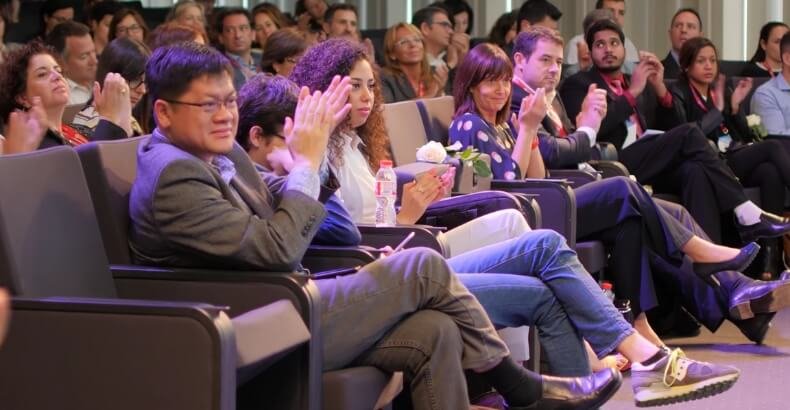
Attendees of a conference are supposed to be the most crucial piece of the puzzle. It is because, without their active engagement, the organizers stay far behind in achieving their objectives.
Researchers find the most suitable platform to share their innovative ideas, and research papers through presentations in front of the entire presence. Panel discussions provide opportunities to have face-to-face interaction with like-minded experts in the field.
Meanwhile, a successful business conference has some key differences from a business conference.
- A successful conference has well-defined attendees
- A clear concept of the purpose of this arrangement
- Includes experienced and knowledgeable keynote speakers
- Workshops and panel discussions for better networking opportunities
- Quality contents.
However, to reach the peak of success, there is no alternative to blending quality keynote speakers, intellectual delegates, and panel discussions.
How to Organize a Successful Business Conference: The Key Steps
With a pre-determined conference goal, you are ready to get on the ground. However, the entire arrangement turns into a daunting task without moving in a systematic process.
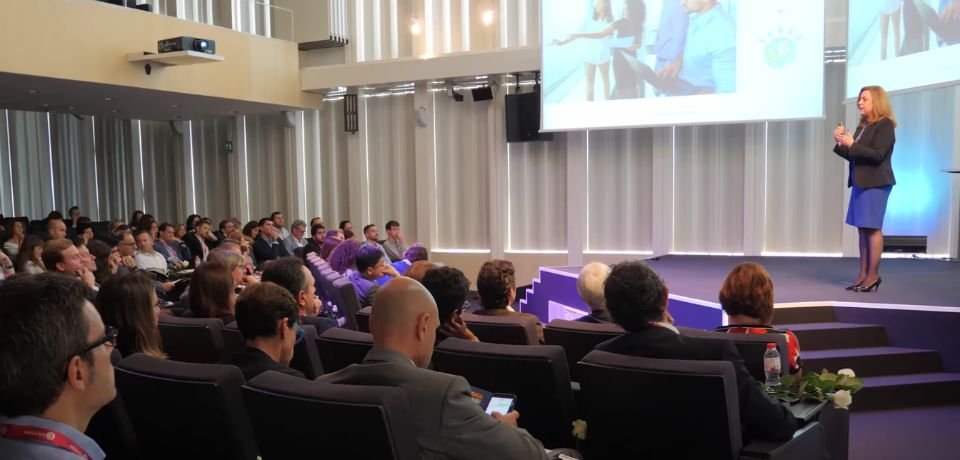
The following 15 steps will guide you to organize a successful business conference with maximum ease.
Step 1: Purpose of the Conference
The first and foremost duty of conference organizers is to be sure about the event’s purpose, or why you’re organizing such an event. Having a specific purpose means, you have taken the first step right.
The purpose includes –
- Knowing the event theme
- Knowing your target audience
- Having a clear idea of the objectives.
Without a definite goal, the entire arrangement remains like a boat without a radar. To be more specific, a clear idea of the goal helps to determine the target audience as well as finalize the budget.
Step 2: Teamwork Brings Success Rapidly
To write the success story of any commercial conference, there is no better alternative than having a team of intellectuals to work for the successful organization of the event.
Moreover, creating a team is required because no successful business conference organizer can deal with every issue alone. Soon after forming a team, the first task is to distribute the responsibilities to the team members depending on their expertise.
The benefits of having a team are –
- Distribution of duties among team members
- Members are accountable for their duties
- It’s easy to keep track of the work.
As you are working in a team, you must be responsible for the task you’re working on. Moreover, the utilization of project management tools will let the team leaders keep track of the work progress.
Step 3: A Safe Location that is Easily Accessible
A safe and secure location, where the participants can get easy access is an essential part of the entire organization procedure. Also, the venue should be appropriate to accommodate the large number of expected attendees.
An appropriate event venue has a few notable characteristics.
- The venue should be in an easily accessible location
- A room with enough space to accommodate all registered attendees
- An appropriate one relevant to your budget
- Having no issues with the security
- Must provide necessary technical support.
Even a spacious room that doesn’t go with your pre-determined cost shouldn’t be an ideal one to organize a successful business conference.
Step 4: Avoid Controversial Dates
You need an extra bit of brainstorming to fix the event date. A date that arises competition with another program on the same date, and location is always deniable.
Here are a few things to consider while finalizing the date –
- No event is scheduled nearby on the fixed date
- Avoid holidays, vacations, and festivals
- It’s better to keep the last of the event on the weekend
That’s not it because an organizer represents his expertise during the organization procedure by fixing the dates at least a few months ago.
Fixation earlier is necessary because your audience must get notified that you’re expecting them in the upcoming event. Moreover, even after registering, attendees require some time to prepare before attending the event.
Step 5: Adequate Budgeting for Proper Management
The entire organization procedure remains on standby until you finalize the budget. It’s ideal to go through a few criteria before determining the total budget.
- Calculate the total expenditure to organize the event
- Estimate the amount to get back from the ticket sales
- Calculate the savings if there is any sponsorship
- Prioritize the major fields of expenses first
- Distribute the total budget in different fields on the arrangement.
However, the major fields that matter for budgeting are the venue cost, speakers’ fees, catering costs, marketing expenditures, logistics, and so on.
Step 6: The Presence of Target Attendees Gives Life to the Event
Experts suggest planning for any commercial conference for 12 months before the event date. The reason is that it provides enough time to convey your message to the targeted audience.
To ensure their presence you need to move ahead systematically.
- Decide the conference theme
- Determine what types of attendees are eligible for your event
- Run lucrative promotions targeting like-minded attendees.
As you know without having a houseful event premises without appropriate attendees, the event stays miles away from success. Therefore, give maximum emphasis on identifying the target audience.
Step 7: Determine the Conference format
Commercial conferences are mostly arranged as offline events on large premises letting the attendees interact with the industry professionals. But what can make the event go beyond the walls of the conference room is streaming it online.
Determining the event format according to your goal is undoubtedly one of the key steps to organize a successful business conference. Mostly, three conference formats are available –
- Offline event takes place in a spacious conference hall
- Online event with attendees joining virtually
- A hybrid event is a physical conference with online streaming
Modern-day conferences are organized following the hybrid method because these events allow people to connect to your event virtually and share opinions. It also expands the reach of your company, which is a good initiative for upcoming events.
Step 8: Plan the Conference Agenda Before the Promotion
A conference agenda works as a guideline for the attendees and it’s good to have a detailed agenda on the promotion page before reaching the target audience.
The agenda must include a few major aspects of the event.
- Brief description of the conference theme
- Organizer’s name and info
- Information about the date and location
- List of the keynote speakers
- Number of expected attendees
- Information about different segments
- Social media addresses and contact info for feedback.
However, the information added to the agenda must remain well-organized to let every attendee understand what will be there on the event date.
Step 9: Choose Ideal Speakers to Engage Attendees
Knowledgeable keynote speakers always work as an asset to any business conference. Most attendees join such events to get valuable insights, learn expertise, and exchange their thoughts with industry professionals.
Choose speakers for your event considering a few things.
- Choose like-minded professionals relevant to your event theme
- Go through the speaker’s track record to assess his/ her expertise in this field
- Speakers with good presentation and interactive skills
- Take opinions from your attendees through social media
- Try including speakers from different backgrounds and cultures for diversity.
With the help of social media platforms, you can ask about speakers in your community and let them suggest the speakers they want to hear from. Moreover, taking opinions from the participants means they hold a great value in the entire arrangement.
Step 10: Promote Your Conference to the Fullest
To maximize the participants’ attendance, you have to rely on the event promotion both offline and online, free and paid. Running social media promotions, and sending personalized emails are the proven ways to promote a business conference.
The first requirement for running the promotive programs is to identify the target audience. After identifying, the next steps are –
- Create a dedicated conference website
- Include the event agenda on the promotion page
- Run paid promotions through social media platforms
- Billboards are a good way for offline promotion
- Personalized emails to target audiences
- Early Birds offer for early registration.
The promotive programs whether they are free or paid must be lucrative. Having the detailed agenda on the promotion page of the conference website will let the visitors decide if it’s worth joining the event after going through the segments.
Step 11: A Hassle-Free Registration is Required
When someone visits the promotion page on the website, it should have a direct link that takes to the registration page. It’s the first major task to offer hassle-free registration to the expected attendees.
So, what should be the overall criteria for a convenient registration process?
- Take the visitor to the registration page from the promotion page
- Allow him/ her to input all necessary details for the registration
- Showcase different ticket prices for sale
- Send a confirmation email.
Sending a confirmation email means that the attendee has been selected for the event and he/ she is good to go with the further procedures.
Step 12: Arrange Workshops and Panel Discussions
Reputed organizers always love to keep their attendees in the limelight. It’s quite obvious because the conference’s success depends on how active the participants were, and if they managed to gain some expertise from the professionals.
Workshops and panel discussions play the most crucial roles in assessing the attendees’ engagement.
- Allow the attendees to share their queries during keynote speakers’ speeches
- Face-to-face interaction with the professionals in the panel discussions
- Workshops allow one to gain expertise.
Quality speakers can connect to the audiences, and from that moment attendees can feel they are an integral part of the event.
Step 13: Maintaining Attendees Comfort
To stay in a conference room is not an easy task any day, and that is why maintaining the highest comfort level for the attendees is a mandatory job.
Here are a few things you can do as an organizer for this.
- Go for an automated check-in system for the registered participants
- Welcome the attendees with a conference package that includes a bag, pen, notepad, and the agenda
- Arrange catering in the middle of the event.
Thus, a comfortable attendee experience can let you achieve the most anticipated success from the event.
Step 14: Ensure a Technically Sound Event
As an organizer, you need to ensure a few facilities inside the conference room to run the event smoothly. With proper technical support, the audience and the speakers can enjoy the program fully.
Here are the major requirements for proper technical support.
- All-time, uninterrupted WiFi service
- Proper lighting inside the room
- No issues with the microphone and speakers
- A large projector to display anything regarding the event.
Before choosing an event venue, an organizer must look for all these facilities. The reason is that these facilities play a supportive role and ensure a seamless run of the event.
Step 15: Follow Up with Your Audience
The job of organizers goes beyond the event premises as they have to reach their audience and take their valuable opinions. Attendees’ opinions matter the most after the event ends because they are the right persons to show the mistakes and lacking.
Here are some tips to follow up with the attendees after the event.
- Arrange a post-event reward segment for the participants
- Take feedback from the attendees regarding their overall experience
- Connect with the social media platforms
The post-event reward is a way to encourage participants to join your upcoming events. Moreover, feedback from attendees allows the organizers to get to their mistakes and work for the betterment of future events.
Common Struggles to Make a Business Conference Successful: Must Know
Proper planning always leads to a successful conference arrangement. But the journey won’t be so pleasant always as you might have to face some issues on the way to arranging a successful business conference.
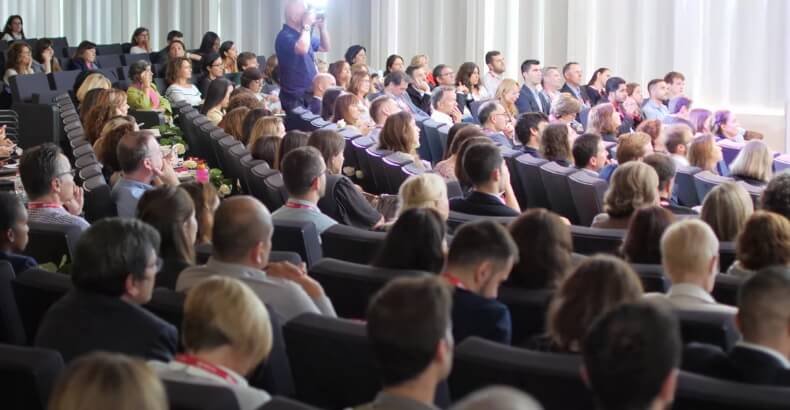
Here are some of the common struggles you might face.
Proper Budgeting Issues
The budget of a conference has a great impact on its success. Organizers must assess the entire budget just after finalizing the event theme and before deciding on the event venue.
The reason is that a specific amount of the budget will be spent on the venue selection. However, not having an adequate budget can hamper the entire arrangement procedure.
Issues that might arise due to improper budgeting are –
- The selected venue might not be up to the mark
- Tough to hire quality speakers
- Inadequate spend for the promotions won’t reach the expected number of audience
- Quality degradation in the food and beverages
- More dependency on the sponsors.
Engagement of The Attendees
Don’t letting the attendees feel idle and bored is indeed a challenging task because it’s a long-term event that continues for hours. Moreover, the participants must not play a passive role inside the conference room.
Maintaining attendee engagement can be tough, but doing certain things might ease the entire process.
- Let the keynote speakers ask simple questions to the audience
- Provide a notepad and allow them to write down what they expect to achieve from the event
- Allow the participants involved in group chats
- Arrangement dedicated interactive sessions and panel discussions.
Wrong Scheduling and Location
Even after having an interesting event theme, running a superb promoting program, and including quality keynote speakers, the conference might not reach the peak of success. The sole reason is having the event on the wrong day and in an unfriendly location.
Here are some tips that work well for your event.
- The conference shouldn’t clash with any other event on the same day
- Avoid arranging events on holidays
- Choose an easily accessible location
- Popular cities are better for such events.
Clarifying the Agenda to the Audience
The management team must have a clear concept regarding the conference agenda because it helps everyone to keep track of their work. Moreover, notifying the expected participants about the agenda means providing a clear idea of the proceedings.
Meanwhile, it appears to be a challenging task when the organizers are not aware of what to include and what not to do.
- Fix what will be there in the event
- Notify the team members about the included segments
- Add the detailed agenda on the conference page.
Maintaining Technical Stability
Having technical issues at some point in the event isn’t something unexpected. However, the ideal way to deal with any such issue is to have a technical team working throughout the entire event to maintain stable support.
Technical instability can cause severe issues during the conference.
- Interrupt the normal proceedings
- Difficult to follow the pre-determined schedule
- Irritate the attendees and the speakers.
Technical soundness therefore appears to be very important to ensure the comfort of the participants and the professionals.
Advantages of Organizing Business Conference: Key Tips for Maximizing Impact
The question is not about arranging a conference, rather it’s about converting the business conference into a successful one. A successful business conference is always beneficial on the part of the organizers.
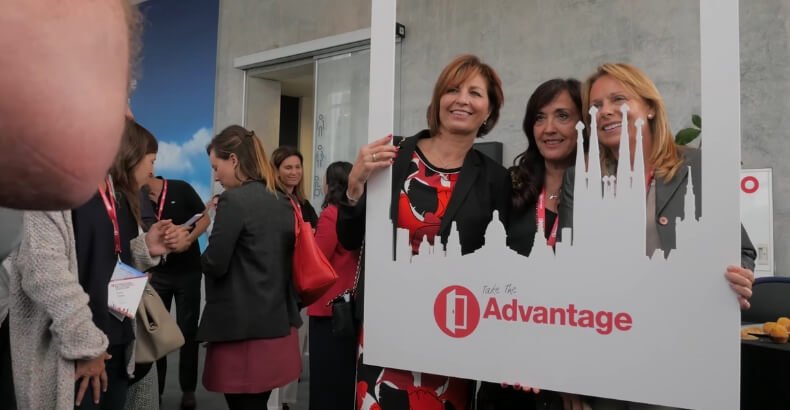
Now, let’s talk about the top 3 major advantages.
Increasing Brand Awareness
If you are new in this field of conference organization, there’s a pretty good chance of earning a good reputation in the community through a successful conference arrangement.
There are two ways to increase the brand value of your company or organization.
- Successful arrangement of a conference
- Sponsorship with a renowned company
On both occasions, people beyond the attendees will start recognizing you as a good organizer and may also consider attending the upcoming event.
Moreover, partnerships with renowned companies enhance your reputation as a company. Again, it would turn out a perfect way to develop your brand value.
Networking and Building Relationships With Attendees
Respect your audiences and their feedback regarding your arrangement. However, is it possible to maintain the connection with your attendees after the program ends?
Yes, it’s possible any day with the blessing of social media platforms. Here are a few things that can be done to increase the network and build relationships with your audience.
- Upload the best presentations on the conference website
- Create memories by having some pictures in the ending phase of the event
- Keep your attendees updated about the upcoming event through regular posts in the community groups
- Take opinions from your audience regarding the speakers’ selection.
However, respecting your audience is merely not taking their feedback, rather it’s all about implementing their feedback in your future events. Thus, organizers can enhance networking and build effective relationships with the attendees.
Generating Revenues from Ticket Sales
A large portion of the total revenue of a conference comes from ticket sales. However, people will find interest in your event when there are signs of you having a good track record in this field.
Therefore, we’ll provide a few tips to enhance ticket sales for maximum revenue.
- Have a lucrative marketing plan for the conference
- Disclose the event agenda to the visitors by adding it to the promotion page
- Upload pictures, the best presentations, and a list of the speakers from your previous events on the website.
The more engaging promotions you run, the chances of getting maximum attendees increase. More attendees means more registrations and more registration means having maximized ticket sales.
What Types of Business Conferences Are Out There?
Before arranging a business conference, you might want to know which specific field you’re looking forward to arranging the conference.
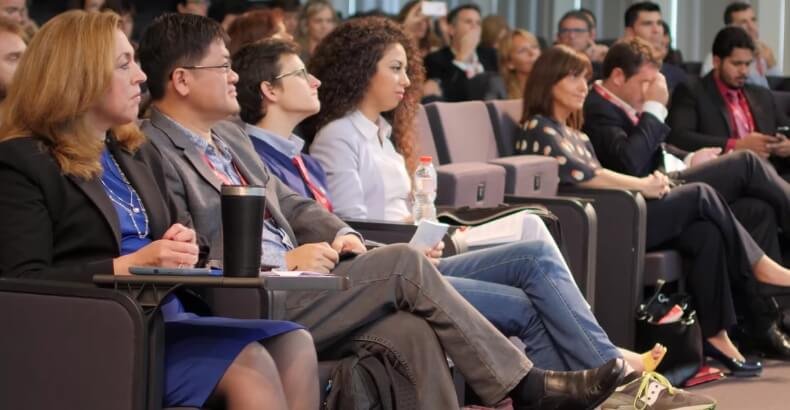
Going through the key conference types may help you a little bit to identify the right type for the upcoming conference.
Industry-Specific Conferences
Industry-specific conferences are organized to discuss the latest trends, developments, and challenges in a specific sector. Like-minded professionals and attendees exchange their ideas to resolve the issues.
Networking and Leadership Conferences
With face-to-face interaction through panel discussion, participants can gain invaluable insights and guidance from industry experts. These events mainly focus on professional development.
Trade Shows and Expos
Trade shows and expos offer business growth by showcasing their latest products or services. However, the audience must be people from the same field, who are interested in your service and products. Only then, there is a chance to grow your business.
Technology and Innovative Conferences
Regardless of which business field you belong to, there is no scope to ignore the impact of technology. Technology and innovative conferences are a broad discussion of the latest technical advancements that might come in favor of your business.
Entrepreneurship and Startup Summits
Entrepreneurship summits are always a good opportunity for newcomers because they offer ample opportunities to collaborate with industry leaders. Moreover, reputed companies might provide financial support for your innovative startup ideas,
Global Business Conferences
There is no better place to meet global industrial leaders, professionals, and business experts to gain expertise than a global business conference. People from different states and cultures join these events.
Frequently Asked Questions
Do you have anything else to know? If the answer is yes, go through the following questions in this FAQ section.
What Are the Steps Involved in Organizing a Business Conference?
Organizing a business conference involves careful planning, from selecting the venue and date to managing logistics. Start by determining the conference theme, target audience, and budget. Once these are set, secure a venue and arrange for speakers, catering, and equipment.
Next, promote the event through social media, emails, and partnerships. On the day of the conference, ensure smooth registration, manage schedules, and provide necessary support to attendees and speakers. Post-event feedback helps improve future conferences.
What Makes an Excellent Conference?
An excellent conference offers a well-organized agenda, engaging speakers, and valuable networking opportunities. Attendees appreciate interactive sessions that encourage participation and learning from industry leaders. A clear, focused theme also contributes to its success.
Moreover, an excellent conference creates a welcoming environment where participants feel connected and inspired. The right balance of content, collaboration, and professional growth leaves a lasting impact, making it a memorable experience for everyone involved.
What Are the Four Features of a Successful Conference?
A successful conference typically has four key features: engaging speakers, relevant topics, effective networking opportunities, and seamless organization. These elements ensure participants stay interested and gain valuable insights throughout the event.
Additionally, clear communication and strong audience interaction further improve the experience, allowing attendees to connect meaningfully with peers. Together, these features help create a memorable and impactful conference that leaves participants feeling inspired and informed.
What is the Agenda of a Conference?
A conference agenda outlines the key activities, discussions, and presentations planned throughout the event. It typically includes the schedule of sessions, keynote speeches, panel discussions, and networking breaks, giving attendees a clear idea of what to expect.
This agenda serves as a guide for participants, ensuring they can plan their time effectively and attend sessions most relevant to their interests. It keeps the event organized, helping everyone stay on track and get the most out of the experience.
Can I Get Feedback from Attendees After the Conference?
Yes, you can gather valuable feedback from attendees after the conference. Sending out surveys or follow-up emails is a great way to understand their experience and suggestions for improvement. Make sure the questions are clear and concise.
Additionally, consider hosting a post-event discussion or providing a space for online reviews. This helps build trust and improves future conferences based on attendees’ insights, making each event better than the last.
The Bottom Line
In order to organize a successful business conference, there is no alternative to working together systematically. The management team has tasks to complete depending on their field of expertise.
However, the good thing about having a team is that a single person doesn’t have to take the immense pressure of managing each and everything. Having accountability also gives pace to the work, and no one can escape their responsibilities on purpose.
So, hope you get the answer to “How to Organize a Successful Business Conference” by focusing on collaboration, clear task delegation, and maintaining strong accountability within your team. A successful arrangement is beneficial for the reputation of the organizing company and helps to achieve victory at the end of the day.